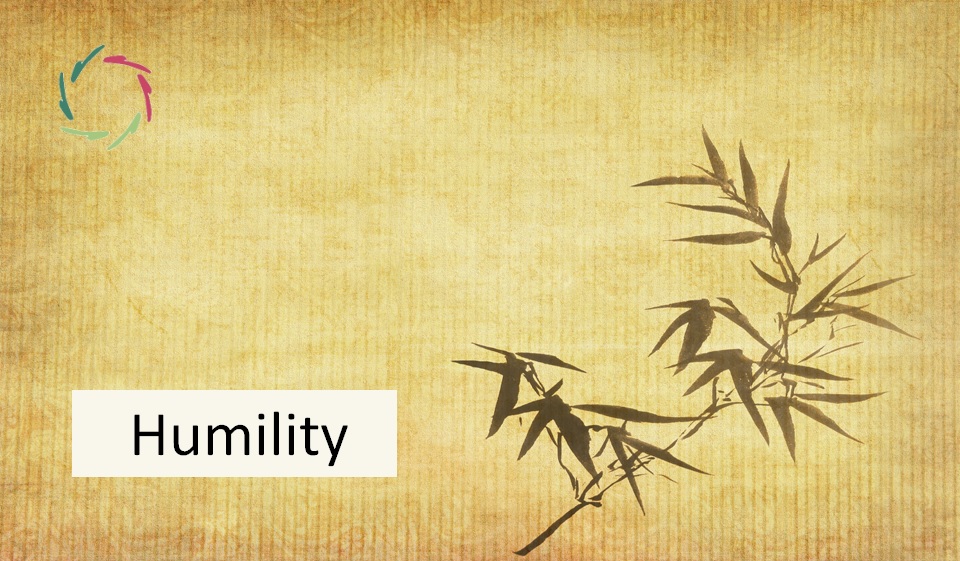Humility

Very important and also immensely difficult. It’s an exercise that may easily last a lifetime: ‘humility of ego’.
You think that you understand what it’s about and at the same time you say ‘I’.
‘I’ know better than many others what humility is.
Great!
Humility doesn’t know itself.
(How I know this? Well…)
‘Knowing yourself’ is of course very important. But it is also valuable to not know yourself. This wisdom can be found in a particular old book in the saying ‘blessed are the poor in spirit’. These are not necessarily the fools or the uneducated, but those who are able to practice not-knowing. Said in AURELIS setting: they for whom the fact of knowing themselves is not standing in the way. Those who can, beyond knowing, appreciate the deeper knowing in not-knowing. That does not need to be much. That can even be very little. Very little is already more than enough for who can look down. Eyes almost closed. Almost closed is heavenly wide open.
Those who know humility, do also know the ‘infinite’ value of it, the value of a total person. Not filled with bla bla bla.
You are almost there. You’re not quite there yet. But you’re almost there. Almost!
It’s worth the effort to dwell on 😊.
Humility does not exchange itself
Me and you and we and they. Who will win? True ‘giving and taking’ is exchange-less. Nobody wins and therefore I do. And therefore you do. And therefore we. And therefore they.
Yeah. If it’s an exchange, you take everything away that another may give you. Then you’ll end up with a lot and there will soon be no place left anymore. ‘That is the way of the world’, you will say.
Correct:.
1 billion people who hunger for food.
7 billion people who hunger for… …for what?
In any case for something that is not to be exchanged.
Humility does not compare itself
‘Each total person is infinitely important.’ Easy: one doesn’t have to compare oneself. Not with the neighbors. Not with the colleagues. Not with the children…
Even not with the person in the mirror.
What is not obvious, because the image in the mirror and the image of what should be, sometimes raise the eyebrows when they look at each other.
I… yeah… who am I? Not that easy! An ego can find 1001 ways to be able to come to the fore. It’s an expert in disguising itself as ‘total self’.
“Look at me.”
Children ask it and rightly so. Children often shout it as hard as they can… But adults are often trained in ignoring since childhood.
How are the children going to learn it then? How would adults have learned it?
On the right you find a piece of a poem that might seem quite idealistic… or is it childlike? Also a child is ‘poor of spirit’. In the same old book as cited earlier, they are also listed as being ‘blessed’. That bliss, I think, is in the first place a very deep form of joy.
‘Childlike’ is not ‘childish’.
In another tradition one likes to speak about beginner’s mind.
Also here ‘it’ doesn’t get in the way. An empty mind takes whatever is thrown at it.
The little poem is the description of a repeated concrete experience, a possible feeling in deep meditation, for example after several days of intensive meditation-‘work’. A special ‘state of mind’ so, not something you just expect or something that even belongs to everyday life, and most certainly not in our culture. And that’s OKAY too of course. It is, however, an experience (a kind of ‘peak experience’, Maslow would say) from which you can learn a lot and which might also be important in a lifetime. I think that it is also an experience that any of us might encounter. The very simplest ‘simplicity’ is a very democratic wealth.
And everything becomes extremely beautiful…
Anyway. It’s recommended.
It teaches ego to be humble, even if that is being very misunderstood. One does not do it with the intention to be misunderstood, of course, but one is not avoiding it anymore. Self-pity? Not necessary. It is up to the humble to find the deep well-being that is present in his situation or in his feeling.
And the ‘infinite’ value.
If the ‘bottom of the soul’ is being touched, you do not even know whether you are inside or outside.
And it doesn’t matter.
It’s always good.
But beware! Beware! Beware! Do not beware! And yet DO beware!


